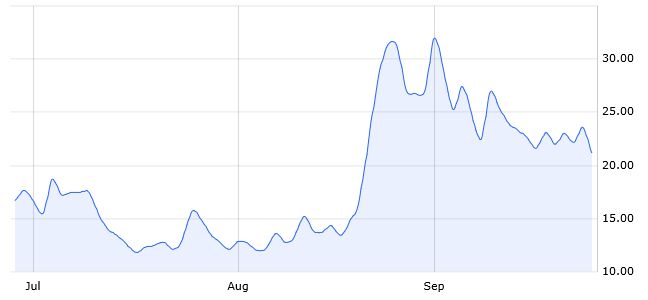 Alternative type investment mutual funds are often pitched as providing decent returns that are not tied to the fate of stocks or bonds. But getting the right asset mix to deliver on both of these goals has proven quite difficult. Alternative fund strategies, in addition to providing diversification, cushion stock-heavy portfolios by reducing volatility. During the extremely volatile markets of recent months, most of what was labeled as alternative funds did come up short on both of their promises.
Alternative type investment mutual funds are often pitched as providing decent returns that are not tied to the fate of stocks or bonds. But getting the right asset mix to deliver on both of these goals has proven quite difficult. Alternative fund strategies, in addition to providing diversification, cushion stock-heavy portfolios by reducing volatility. During the extremely volatile markets of recent months, most of what was labeled as alternative funds did come up short on both of their promises.
The ideal alternative fund should eliminate volatility as much as possible while providing a steady, competitive rate of return. Collectibles are often used to add an extra level of diversification despite lacking liquidity. Within collectibles, (not quite a mainstream investment vehicle), the rare book market is often being considered as the means to “slow but steady” growth.
When managed properly, knowledge acquired through specialization is a key component and can be quite rewarding. Investing in rare books is not recommended for everyone due to lack of liquidity, or difficulty of connecting sellers with potential buyers. Ideally, in a perfect rare book marketplace, books are traded in a way similar to stocks. Investment advisors are then able to package the collectibles as part of an alternative type investment for their clients.
The rare book business is capital intensive. It takes a significant sum of money to build and maintain a large inventory, and most booksellers lack funding and they have small inventories. This has always been true to some extent, but the trade is more divided between the few well-capitalized dealers and the majority that strive to grow. The separation is more apparent at book fairs where some are only open to the elite ABAA or IOBA members while others are open to anyone that pays the price for a booth. Small sellers with quality inventory can still do very well, but the disadvantage is obvious.
In an imperfect market, the bid-ask spread, the prices quoted for an immediate sale (ask) and those for an immediate purchase (bid) are relatively static due to the illiquidity of the market. While the Internet has unquestionably added immensely to the liquidity of the rare book market, it still lacks considerably when compared to the stock exchanges. Buyers can easily search for the most competitive “ask” price for the item they are interested in and are able to compare offerings from sellers worldwide but the heterogeneity of rare books is a huge obstacle. In theory, no two used books can be considered alike and thus priced and traded as identical.
Unlike the mechanics of a stock exchange, the buyer’s “bid” information is, to a great extent, hidden from the rare book marketplace. Historic sales, especially those published at auction events, offer a way to determine what bidders have offered. Despite the efficiencies provided by the Internet, for the most part, buyer pricing remains quite hard to collect and analyze. Our Rare Book Sale Monitor (RBSM) is relying on a variety of sources including auctions, on-line marketplace partnerships and dealer reports to record sale pricing for rare books actively trading hands.
In order to improve the efficiency of the marketplace, promote a less imperfect market, and improve the liquidity of this less volatile but rewarding market, we have launched our Rare Book Offer Manager (RBOM). This will allow a buyer to place offers for rare books they are interested in buying. Our network of dealers will consider all offers and try to make a deal. There is no obligation on behalf of the buyer to complete the transaction, and unlike auction events, there is no buyer premium.
Please visit our Rare Book Offer Manager and let us know what you think.



{ 0 comments… add one now }